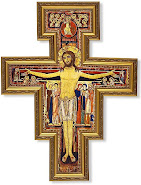Why the Temple Meant the World to Israel
 In my previous post (video clip), Dr. Scott Hahn provides a great understanding of how the ancient Israelites saw the whole world as a temple in Genesis & Book of Exodus. Another great Biblical Scholar of mine, Michael Barber, in his book, Coming Soon: Unlocking the Book of Revelation (pg 16-17), gives us more information on the connection between the Temple and the World, and relating it to Jesus’ discourse in Matthew 24. . .
In my previous post (video clip), Dr. Scott Hahn provides a great understanding of how the ancient Israelites saw the whole world as a temple in Genesis & Book of Exodus. Another great Biblical Scholar of mine, Michael Barber, in his book, Coming Soon: Unlocking the Book of Revelation (pg 16-17), gives us more information on the connection between the Temple and the World, and relating it to Jesus’ discourse in Matthew 24. . .
“Why did Jesus describe the end of the world when he predicted the destruction of the temple (Mt. 24:1-2)? The answer is connected to the way God ‘writes’ the world.
To ancient Israel, the temple was a miniature model of the world. When Moses built the tabernacle (a mobile temple) and Solomon built the temple itself, they did so in ‘sevens’ – seven days, seven months, and seven years. Why? They imitated the way God created the World in seven days. In fact, the Book of Job describes creation in terms of temple building (Job 38:4-7). The temple is a scale model of the world, and the world is one giant temple.
The temple meant the world to Israel – literally. The temple was the symbol of the world. For Jesus and the people of Israel in His day, then, the destruction of the temple symbolized the end of the world. That is why Jesus’ sermons on the end of the world are always given in the context of a prediction of the destruction of Jerusalem and its temple.
And Jesus was true to His words. In AD 70, about forty years after He ascended back into heaven, Jerusalem and its temple were destroyed. With this event, the ritual order of the Old Testament came to a definitive end. The temple sacrifice and the Old Testament priesthood were no longer possible. Jesus was right – the end came within one generation (Greek word, ‘gene’ refers to a period of 40 years) {Mt. 24:34}.
Furthermore, Christians heeded Jesus’ warning: “Then let those who are in Judea flee to the mountains, and let those who are inside the city depart” (Lk. 21:21). The early Christians escaped from Jerusalem and fled to Pella just before the Roman legions arrived to besiege Jerusalem. Not a single Christian perished.
Moreover, Jesus’ warning to flee Jerusalem can also be understood spiritually as an admonishment to abandon the obsolete temple sacrifices. Now that He has come and has offered Himself as our sacrifice, there is no longer the need for the Levitical system of priestly sacrifice. Jesus is saying, “Don’t be attached to it, but flee!””











